Related Research Articles

Palatino is the name of an old-style serif typeface designed by Hermann Zapf, initially released in 1949 by the Stempel foundry and later by other companies, most notably the Mergenthaler Linotype Company.
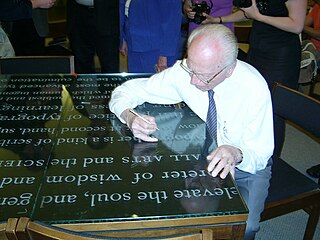
Hermann Zapf was a German type designer and calligrapher who lived in Darmstadt, Germany. He was married to the calligrapher and typeface designer Gudrun Zapf-von Hesse. Typefaces he designed include Palatino, Optima, and Zapfino. He is considered one of the greatest type designers of all time.

Matthew Carter is a British type designer. A 2005 New Yorker profile described him as 'the most widely read man in the world' by considering the amount of text set in his commonly used fonts.

Frederic William Goudy was an American printer, artist and type designer whose typefaces include Copperplate Gothic, Goudy Old Style and Kennerley. He was one of the most prolific of American type designers and his self-named type continues to be one of the most popular in America.

Cooper Black is an ultra-bold serif typeface intended for display use that was designed by Oswald Bruce Cooper and released by the Barnhart Brothers & Spindler type foundry in 1922. The typeface was drawn as an extra-bold weight of Cooper's "Cooper Old Style" family. It rapidly became a standard typeface and was licensed by American Type Founders and also copied by many other manufacturers of printing systems.

Kris Holmes is an American typeface designer, calligrapher, type design educator and animator. She, with Charles Bigelow, is the co-creator of the Lucida and Wingdings font families, among many other typeface designs. She is President of Bigelow & Holmes Inc., a typeface design studio.
Robert Joseph Slimbach is Principal Type Designer at Adobe, Inc., where he has worked since 1987. He has won many awards for his digital typeface designs, including the rarely awarded Prix Charles Peignot from the Association Typographique Internationale, the SoTA Typography Award, and repeated TDC2 awards from the Type Directors Club. His typefaces are among those most commonly used in books.
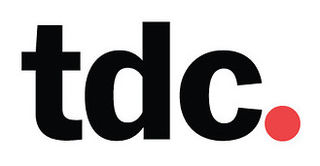
The Type Directors Club (TDC) is an international organization devoted to typography and type design, founded in 1946 in New York City. TDC believes that type drives culture, and that culture drives type—and is dedicated to cataloging, showcasing, and exhibiting typography worldwide.
The International Typeface Corporation (ITC) was a type manufacturer founded in New York in 1970 by Aaron Burns, Herb Lubalin and Edward Rondthaler. The company was one of the world's first type foundries to have no history in the production of metal type. It is now a wholly owned brand or subsidiary of Monotype Imaging.

Gudrun Zapf-von Hesse was a German book-binder, calligrapher and typographer.
Julian Waters is a calligrapher, type designer and teacher.
The Officina Bodoni was a private press operated by Giovanni Mardersteig from 1922. It was named after the great eighteenth-century Italian typographer Giambattista Bodoni. The Officina Bodoni is known for printing books of the very highest quality and the finest craftsmanship.
Rick Cusick is an American lettering artist, calligrapher, type designer and book designer.
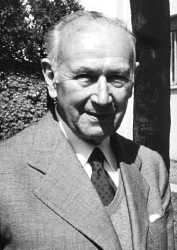
Giovanni Mardersteig was a German-born printer and typographer, making much of his career in Italy. He is particularly known for founding and running Officina Bodoni, a small press producing high-quality editions, and his typeface Dante.
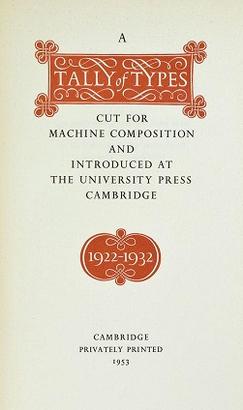
A Tally of Types is a book on typography authored by the type designer Stanley Morison. It was first published in 1953, and showcases significant typeface designs produced during Morison's tenure at the Lanston Monotype Corporation for their hot-metal typesetting machines during the 1920s and 1930s in England.
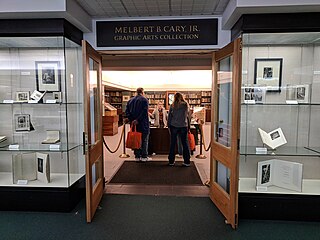
The Cary Graphic Arts Collection is a library and archive of books, type specimens, manuscripts, documents, and artifacts related to the history of graphical communication. Located in Wallace Library at the Rochester Institute of Technology (RIT), in Henrietta, New York, the Cary Collection contains literate artifacts as old as cuneiform tablets and as recent as computer tablets and e-books, in all comprising some 40,000 volumes in addition to manuscripts, correspondence, printing types and traditional letterpress printing equipment.

A reverse-contrast or reverse-stress letterform is a design in which the stress is reversed from the norm: a typeface or custom lettering where the horizontal lines are the thickest. This is the reverse of the vertical lines being the same width or thicker than horizontals, which is normal in Latin-alphabet writing and especially printing. The result is a dramatic effect, in which the letters seem to have been printed the wrong way round. The style invented in the early nineteenth century as attention-grabbing novelty display designs. Modern font designer Peter Biľak, who has created a design in the genre, has described them as "a dirty trick to create freakish letterforms that stood out."

Bertha Matilda Sprinks Goudy was an American typographer, fine press printer, and co-proprietor with Frederic Goudy of the Village Press from 1903 until her death in 1935.
Edna Rudolph Beilenson (1909–1981) was an American typographer, fine press printer, typesetter, book designer, cook book author, publisher, and co-proprietor of the Peter Pauper Press from 1931 until his death in 1962, and afterward its sole proprietor and president until her death in 1981.
References
- ↑ "The RIT Frederic W. Goudy Award: 27 Years of Excellence in Typography". Archived from the original on 2014-07-14. Retrieved 2014-07-04.
- ↑ "Twenty Years of the Frederic W. Goudy Award". Archived from the original on 2014-07-14. Retrieved 2014-07-04.
- ↑ Twenty Years of the Frederic W. Goudy Award
- ↑ Hermann Zapf, Goudy Award Winner 1
- ↑ "Warren Chappell, Goudy Award Winner 2". Archived from the original on 2014-07-14. Retrieved 2014-07-04.
- ↑ R. Hunter Middleton, Goudy Award Winner 3
- ↑ Giovanni Mardersteig, Goudy Award Winner 4
- ↑ Robert Lincoln Leslie, Goudy Award Winner 5
- ↑ P. J. Conkwright, Goudy Award Winner 6
- ↑ Will Carter, Goudy Award Winner 7
- ↑ Edward M. Catich, Goudy Award Winner 8
- ↑ Laurance Siegfried, Goudy Award Winner 9
- ↑ Howard N. King, Goudy Award Winner 10
- ↑ Alexander S. Lawson, Goudy Award Winner 11
- ↑ Edna Beilenson, Goudy Award Winner 12
- ↑ Freeman Craw, Goudy Award Winner 13
- ↑ Berthold Wolpe, Goudy Award Winner 14
- ↑ Bradbury Thompson, Goudy Award Winner 15
- ↑ John Dreyfus, Goudy Award Winner 16
- ↑ Roderick Stinehour, Goudy Award Winner 17
- ↑ Matthew Carter, Goudy Award Winner 18
- ↑ Charles Bigelow, Goudy Award Winner 19
- ↑ Adrian Frutiger, Goudy Award Winner 20
- ↑ G. G. Lange, Goudy Award Winner 21
- ↑ Ed Benguiat, Goudy Award Winner 22
- ↑ Gudrun Zapf von Hesse, Goudy Award Winner 23
- ↑ Henry Morris, Goudy Award Winner 24
- ↑ Walter Tracy, Goudy Award Winner 25
- ↑ Robert Norton, Goudy Award Winner 26
- ↑ Kris Holmes, Goudy Award Winner 27
- ↑ "Jerry Kelly Goudy Award Winner 28". Archived from the original on 2016-11-05. Retrieved 2016-11-04.
- ↑ Robert Bringhurst, Goudy Award Winner 29
- ↑ "Claire Van Vliet, Goudy Award Winner 30".
- ↑ Auburn, Luke (October 1, 2018). "RIT Cary Graphic Arts Collection to honor Adobe principal type designer Robert Slimbach". RIT University News. Retrieved January 18, 2019.
- ↑ Gawlowicz, Susan (October 21, 2019). "Master stone carver John Everett Benson awarded Goudy Award". RIT University News. Retrieved March 9, 2020.
- ↑ Byrne, Peter. "Goudy Award Presentation and Lecture". Rochester Institute of Technology. Retrieved 20 April 2021.